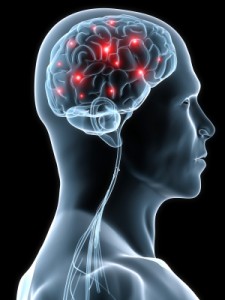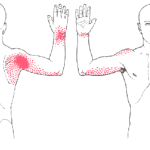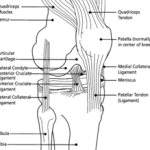Introduction
Concussion is a common injury sustained by athletes in contact sports (Hunt & Asplund, 2010). Subsequently, it is a condition commonly encountered by the sports physiotherapist, particularly those who work on the sidelines of contact sports. Given its frequency, concussion has been discussed previously on this site:
However, the previous article does not discuss indicators to predict recovery timeframes following concussion. That is exactly what this article does.
What Is Known Already About Concussion?
Concussions are very common, in the United States it is suggested that there are approximately 3.2 million a year (Meehan et al., 2010). Whilst there is no clear or universal definition for concussion, one commonly accepted definition is:
A complex pathophysiological process affecting the brain,
induced by traumatic biomechanical forces (Aubry et al. 2001)
Whilst there are many defining characteristics one of the most important is that the symptoms are transient. Collins et al (2006) suggested 50% of sufferers recover within 1 week, with 87% recovered by the 3 week mark. Thus, we can see that most recover quickly, however, 13% still take longer than 3 weeks to recover.
As a sports physiotherapist it would be incredibly valuable to be able to predict which concussion sufferers will recover quickly and which will undergo a ‘protracted’ recovery. Some research exists evaluating factors that are associated with outcomes following concussion. It has been shown that decreased performance on neuro-cognitive testing and the presence of migraine/somatic cluster symptoms in the subacute period are associated with protracted recovery (Iverson, 2007; Lau et al., 2009; Lau et al., 2011).
But who wants to wait for that kind of prognostic information?
The relevant parties, including patients, families, players, coaches etc, want information on predicted recovery and return to play (RTP) as quickly as possible. Until recently, no research was available regarding the prognostic value of on-field signs and symptoms. This takes us to new research…
New Research On Predicting Recovery from Concussion
Lau et al (2011) have just published an article which attempts to identify what on-field signs or symptoms will predict a protracted (>21 days) as opposed to rapd (< 7 days) return to play from concussion in male high-school athletes. The 5 year prospective study followed through 107 subjects (69 were lost to follow-up) following their concussion, and identified which on-field signs and symptoms were associated with protracted recovery. Qualified sports medicine practitioners evaluated the concussed athlete immediately following the incident and noted the presence or absence of the following:
- Confusion
- Headache
- Loss Of Conciousness
- Post-Traumatic Amnesia
- Retrograde Amnesia
- Balance Problems (Rhomberg Test, heel toe and tandem walking)
- Dizziness
- Visual Problems
- Personality Changes
- Fatigue
- Sensitivity to Light
- Numbness
- Vomiting
The time-frame to return to play for each athlete was then recorded. Clearance for RTP was given by qualified concussion specialists and only allowed when the player satisfied criteria from established protocols. Essentially, this included complete resolution of resting and exertional symptoms and return to pre-injury cognitive functioning as measured by the Post Concussion Symptom Scale and Immediate Post-concussion Assessment and Cognitive Test (ImPACT).
So the $64,000 question is which of these on-field signs/symptoms were associated with a ‘protracted’ recovery?
What On-Field Signs/Symptoms Predict Recovery from Concussion?
And the winner is…. dizziness! That’s right: dizziness. In fact, none of the other signs or symptoms had a statistically significant association with protracted recovery. Interesting, huh. When it comes down to it, if the athlete reported the perception of dizziness they were 6.34 times more likely to suffer a protracted recovery.
Limitations of The Research
As usual, there are a few limitations of this study of which the authors are aware. These include:
- The study only includes male high-school athletes (13-19 years old). This means generalisability to the general population is unavailable.
- There was a huge dropout rate of 69/176 (or 39%).
- The sample did not include athletes with a prolonged loss of consciousness.
- Some measures utilised may lack the sensitivity to highlight deficits given that only a brief examination was undertaken on the sideline. This does, however, make it more clinically relevant!
Clinical Implications of This Research
If you work with athletes from this population, it offers the clinical implication that:
- Dizziness following concussion will suggest an increased likelihood of protracted recovery
- Other on-field signs and symptoms are not associated with a prolonged period of return to play.
What Are Your Thoughts?
What are your thoughts on this new research? Do you feel this correlates with your own clinical experiences? Be sure to let me know in the comments or catch me on Facebook or Twitter.
References
Aubry M, Cantu R, Dvorak J, et al. Summary and agreement statement of the First International Conference on Concussion in Sport, Vienna 2001. Recommendations for the improvement of safety and health of athletes who may suffer concussive injuries. Br J Sports Med 2002;36(1):6–10
Collins MW, Lovell MR, Iverson GL, Ide T, Maroon J. Examining concussion rates and return to play in high school football players wearing newer helmet technology: at three-year prospective cohort study. Neurosurgery. 2006;58(2):275-286.
Hunt T, Asplund C. Concussion Assessment and Management. Clinics in Sports Medicine 2010; 29(1): 5 – 17
Iverson GL. Predicting slow recovery from sport-related concussion: the new simple-complex distinction. Clin J Sport Med. 2007;17: 31-37.
Lau BC, Collins MW, Lovell MR. Sensitivity and specificity of sub-acute computerized neurocognitive testing and symptom evaluation in predicting outcomes after sports-related concussion. Am J Sports Med. 2011 Feb 7.
Lau B, Lovell MR, Collins MW, Pardini J. Neurocognitive and symptom predictors in recovery in high school athletes. Clin J Sports Med. 2009;19(3):216-221.
Lau BC, Kontos AP, Collins MW, Mucha A, Lovell MR. Which On-field Signs/Symptoms Predict Protracted Recovery From Sport-Related Concussion Among High School Football Players? Am J Sports Med 2011 39: 2311
Meehan WP 3rd, d’Hemecourt P, Comstock RD. High school concussion in the 2008-2009 academic year: mechanism, symptoms, and management. Am J Sports Med. 2010;38(12):2405-2409.
Related Posts
Comments












Good Day,
Has there been any research on training protocols that try and prevent concussions?
Thank you,
Chris
Hi! Love ur articles!
What’s ur opinion on multiple concussions and when someone should retire because of too many?
Thanks for ur help!
Nic